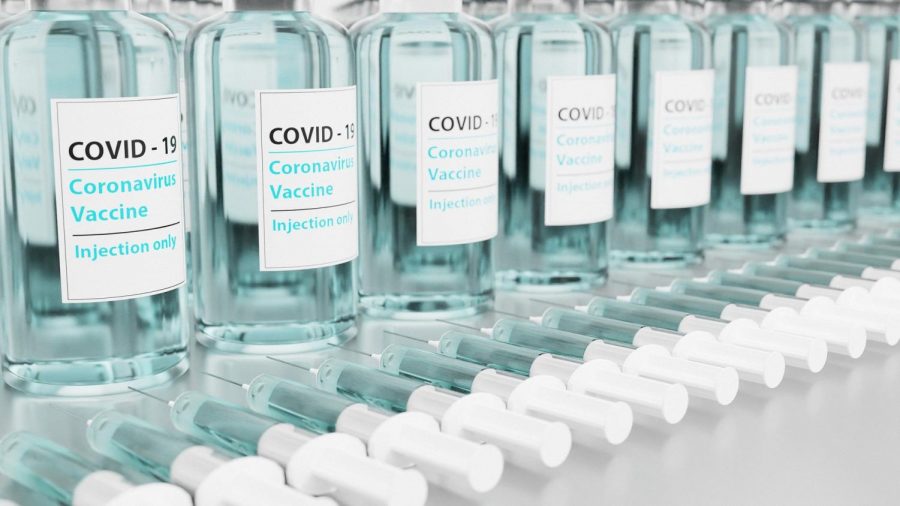OC sounds off: the vaccine dilemma
February 23, 2021
For (Gabriel Souza):
The COVID-19 pandemic has plagued the world since as early as November 2019, and it has been the mission of the world’s top scientists and doctors to find and make a vaccine for this lethal virus. Finding a vaccine is one of the few solutions that will enable the world to overcome the constraints that have been placed upon it.
During the early stages of the pandemic, the stay at home orders that were enacted in many states forced thousands of businesses to lay off workers. According to the U.S. Bureau of Labor Statistics, the unemployment rate hit a recent high of 14.7% in April 2020, while the stay at home orders were in full effect. Although the unemployment rate has slowly declined down to 6.7% in November 2020 (most recent data available), that is still significantly higher than pre-pandemic rates, where in April 2020 it was 3.5%.
The best solution to help unemployed Americans that have been financially suffering since March, is to get a majority of them vaccinated. Once most have been vaccinated, there will be much less risk for spread of COVID-19 in businesses such as restaurants, hotels, and stores that have endured the brunt of the pandemic.
One aspect that has worried many Americans is the safety of the vaccine. Many rumors and conspiracy theories have spread throughout social media about the effects of the vaccine, but those are simply deceitful falsehoods.
The U.S. Food and Drug Administration issued an emergency use authorization for the Pfizer-BioNTech coronavirus vaccine in mid-December, and shortly after the Moderna vaccine was also authorized. The vaccines went through intense evaluations to ensure that they were safe for use.
“Today’s action follows an open and transparent review process that included input from independent scientific and public health experts and a thorough evaluation by the agency’s career scientists to ensure this vaccine met FDA’s rigorous, scientific standards for safety, effectiveness, and manufacturing quality needed to support emergency use authorization,” said FDA Commissioner Stephen M. Hahn, in a December FDA news release.
Personally, my father has received the vaccine; he has not died, or suffered any serious medical injuries due to the vaccine. The vaccine is safe, and it is an important step in the recovery process from the COVID-19 pandemic.
Against (Jackson Morgan):
The first vaccine created was in 1796 by Edward Jenner in Berkeley, England. The vaccine was created from the pus of a cowpox lesion and inoculated into a little boy’s hand, creating immunity to chicken pox. Since then vaccines have been evolving for centuries into the modern day vaccine that is routinely given at doctor’s appointments. Now that there are Pfizer and Moderna COVID-19 vaccines many are questioning the safety of them and rightfully so.
Vaccines are usually developed over the course of 10-15 years, and in some cases longer, yet the COVID-19 vaccine was created in approximately nine months. This huge difference in time from other vaccines and the COVID-19 one raises the question of how do we know the long term effects of the vaccine? The simple answer is that we don’t. There is nobody that has had the vaccine for more than just a few weeks, meaning nobody knows if years down the line it could lead to cancer, infertility, or any other diseases.
According to Healthline approximately 63 percent of people who have received the COVID-19 vaccine have experienced side effects according to Healthline, compared to the flu vaccine where approximately 1-2 percent of people experience side effects. This means that people are roughly 42 times as likely to experience side effects from the vaccine than from the flu vaccine.
If there is a side effect rate this high for the vaccine then there needs to be more research and development into it rather than rushing it out. Dr Matthew Heinz, a hospitalist in Tucson, Arizona, suggests that you should receive the vaccine when it’s easier to manage side effects. Clearing your whole schedule because you know you are very likely to deal with side effects should not be an issue to have with a vaccine, as they should be safe and convenient.
Even after the first dose, people still will not have full immunity since it requires two doses for the 95 percent immunity to be acquired, making it more inconvenient because if the second dose is not received in time, then that is wasted time and money on the first dose. This is too problematic for a virus that has a 99 percent survival rate since there is no guaranteed protection.
The COVID-19 vaccine should only be taken in circumstances where there is a higher risk of dying from the virus, such as people older in age and who have heart conditions, lung conditions, weakened immune system, severe obesity, or diabetes. Whereas people that are not as likely to die from the virus should wait for further developments and advancements in this vaccine as well as knowledge about the virus itself.




